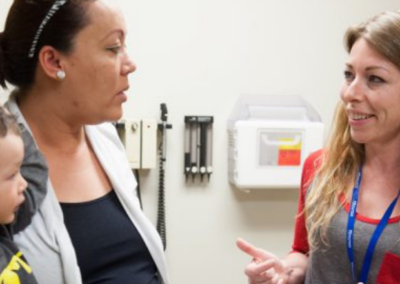Webinar Series: Intentionally Integrating Equity into SDOH Interventions

Many healthcare and community-based organizations are implementing social determinants of health (SDOH) interventions within their communities to help improve health outcomes, yet some of these initiatives are not yielding the desired results. These interventions mainly target populations from historically underinvested communities that have unfortunately have perceived and/or experienced a healthcare system that perpetuates discrimination and disparities in care.
Addressing SDOH or social risks alone cannot be conflated with tackling inequity – and doing so can put interventions at risk of unintentionally perpetuating disparities. This means integrating equity into the design and evaluation of SDOH interventions is paramount, which includes meaningful integration of:
- Cultural humility
- Root causes behind health disparities
- Language concordance
- Community alignment
- Tailored patient experience.
In this webinar series, health equity champions from across the country will share their experiences integrating equity into SDOH interventions — highlighting best practices, tools, and frameworks that attendees can apply to their own SDOH work. Attendees will better understand their role as change agents in an inequitable system and have the opportunity to engage in a space that focuses on uplifting and advancing equity, in particular racial equity, and tackling the systemic injustices that impact health.
Part 1: Equity’s Role in SDOH Interventions – Implementation – April 7, 2020
Part 2: Equity’s Role in SDOH Interventions – Advocacy and Systems Change – June 4, 2020
Part 3: Equity’s Role in SDOH Interventions – Data Democratization – August 20th, 2020
Part 4: Equity’s Role in SDOH Interventions – Evaluation – October 6, 2020
Part 5: Equity’s Role in SDOH Interventions – Technology – December 3, 2020
Part 1: Equity’s Role in SDOH Interventions – Implementation
In this 60-minute interactive webinar originally broadcasted on April 7, 2020 four health equity champions discuss equity’s role in the design and implementation process of SDOH interventions with a lens towards equity-centered human design. Panelists highlight the tactical approaches and strategies of integrating equity that has led to results and better outcomes in their communities, including:
- Ensuring screening efforts display cultural humility and align with the community;
- Designing SDOH interventions with the most marginalized communities in mind;
- Understanding the role SDOH interventions have in addressing implicit or explicit discrimination perpetuated by the health system
Panelists
- Leticia Reyes-Nash – Director of the Office of Programmatic Services and Innovation, Cook County Health
- Moraya Moini – Director of Programs, Los Angeles County Department of Health Services, Women’s Health Programs and Innovation
- Nimisha Patel – Associate Vice President of Management Services, Duke Health | Private Diagnostic Clinic, PLLC
- Tigee Hill – National Director of Partnerships and Initiatives, Health Leads
Moderator
- Artair Rogers, Director of Programs, California, Health Leads
Download the Presentation Slides
Part 2: Equity’s Role in SDOH Interventions – Advocacy and Systems Change
In part 2 of this webinar series originally broadcasted on June 4, 2020 three health equity champions demonstrate how integrating health care and social care can be used to advocate for equitable systems change and uplift the voices of historically underinvested and/or underrepresented groups. Panelists share strategies and best practices that can be used to advocate for broader systems change to dismantle structures that promote institutionalized inequity, including:
- Shifting and sharing power
- Rethinking typical resource navigation approaches
- Reframing narratives often seen as barriers for investing in health equity work
Panelists
- Rhea Boyd, MD, MPH, FAAP, Chief Medical Officer, San Diego 211 | Clinician, Palo Alto Medical Foundation
- Daniel Jones, MD, Sanderson Chair in Obesity, Metabolic Diseases and Nutrition and Professor of Medicine and Physiology, The University of Mississippi Medical Center
- Lauren Powell, MPA, PhD, Founding Executive Director, TIME’S UP Healthcare | President & CEO of The Equitsit, LLC
Moderator
- Artair Rogers, Director of Programs, California, Health Leads
Recommend Resources:
- Watch Part One of the Intentionally Integrating Equity into SDOH Interventions Webinar Series: Equity’s Role in SDOH Implementation and the follow-up Q&A Webinar
- Flattening The Next COVID-19 Curve – Our Essential Resources
Learn more about our panelists and their work:
- Rhea Boyd, MD, MPH, FAAP: Police, Equity, and Child Health
- Daniel W. Jones, MD: Risk Factors for Coronary Heart Disease in African Americans
- The Atherosclerosis Risk in Communities Study, 1987-1997
- Lauren Powell, MPA, PhD: Dr. Lauren Powell on TIMES UP Healthcare | Empowered Healthcare
Download the Presentation Slides
Part 3: Equity’s Role in SDOH Interventions – Data Democratization
In part three of this webinar series originally broadcasted on August 20, 2020 three health equity champions discuss the benefits of data democratization, which simply put, is putting data in the hands of the people when making decisions about the living conditions that impact their health. Data democratization helps dismantle power structures by enabling under-resourced communities, particularly Black, Indigenous, and Latinx communities, understand both the opportunities and gaps in essential health resources in their local area. Panelists highlight key components of data democratization, discuss best practices and lessons learned, and share examples of how they’ve implemented this approach in their communities. Topics include:
- Data democratization as an essential anti-racism tactic in SDOH interventions
- Community-owned data leading to shifts of power and changes in racial inequity
- Key steps toward implementing data democratization in your work
Panelists
- Sheena Nahm McKinlay, MPH, PhD, Vice President of Research & Development, Health Leads | Adjunct Professor, The New School for Public Engagement
- Enrique Valencia, Project Director, Orange County Environmental Justice
- Amy Carroll-Scott, MPH, PhD, Associate Professor at Drexel University Dornsife School of Public Health
Moderator
- Artair Rogers, Director of Program, California, Health Leads
Recommended Resources:
- Data Democratization: The Unsung Hero Of Health Equity
- Intentionally Integrating Equity into SDOH Interventions Webinar Series: Part One: Implementation & Part Two: Advocacy and Systems Change
Part 4: Equity’s Role in SDOH Interventions – Evaluation
In part four of this webinar series originally broadcasted on October 6, 2020 three health equity champions discuss advancing equity and anti-racism through research and evaluation. Healthcare has a long history of perpetuating racial disparities and inequitable outcomes, especially through research and evaluation. Infamous studies, like the Tuskegee Study of Untreated Syphilis, have illustrated the unethical treatment and mistreatment towards communities of color within healthcare. With this legacy, research and evaluation efforts in social determinants of health (SDOH) interventions must be vigilant to not perpetuate inequity and/or racism.
During this webinar, panelists highlight equity-oriented methods used in SDOH research and evaluation, discuss best practices and lessons learned, and explore the opportunities to integrate equity into SDOH research and evaluation efforts in our current context. Topics will include:
- Current approaches to research and evaluation that has advanced or stifled racial health equity
- The bias that occurs within SDOH research and evaluation that is harmful to communities of color
- Strategies that both elevate racial health equity and center the needs and interests of communities served
- The capability of research and evaluation to promote justice by influencing practice, policy, and systems change
Panelists
- Etsemaye Agonafar, MD, MPH, MS, health services researcher and internal medicine physician, Department of Health System Science at Kaiser Permanente’s Bernard J. Tyson School of Medicine
- Tamara Cadet, PhD, LICSW, MPH, associate professor, Simmons School of Social Work
- Adam Schickedanz, MD, PhD, pediatrician and health services researcher, Department of Pediatrics at the David Geffen School of Medicine at the University of California, Los Angeles
Moderator
- Artair Rogers, Director of Program, California, Health Leads
Recommended Resources:
- Intentionally Integrating Equity into SDOH Interventions Webinar Series: Part One: Implementation, Part Two: Advocacy and Systems Change & Part Three: Data Democratization
Part 5: Equity’s Role in SDOH Interventions – Technology
In the latest edition of this webinar series broadcasted on December 3rd three health equity champions discuss the importance of intentionally centering the community and racial health equity when investing in and implementing technology solutions. During this webinar, panelists highlight equity-oriented methods, best practices, and lessons learned to ensure technology solutions both center and are accountable to racial health equity principles and community voice. Topics include:
- Approaches to help ensure technology investment structures that promote equity
- Processes to center and incorporate the voices of the affected populations, especially BIPOC, in technology solutions
- Methods to hold technology solutions accountable to racial health equity principles and community voice
We encourage those who are interested in the intersection of social needs and health equity work to attend, ask questions, and share their experiences.
Panelists
- Robert Phillips, MPA, MPH, President & CEO, Alluma
- Tessa Cruz, Director of Outreach and Engagement, Streetwyze
- Julie Wang, MBA, Director of Innovative Partnerships, Health Leads
Moderator
- Artair Rogers, Director of Program, California, Health Leads
Recommended Resources:
- Intentionally Integrating Equity into SDOH Interventions Webinar Series: Part One: Implementation, Part Two: Advocacy and Systems Change, Part Three: Data Democratization, Part Four: Evaluation




